Curriculum
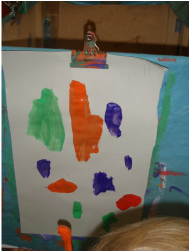
What do we do at playgroup?
We follow the EYFS curriculum or the Early Years Foundation Stage, which sets out seven areas of learning that must be included in a child's early years experience. These areas are Personal Social and Emotional Development, Physical Development, Communication and Language, Literacy, Maths, Understanding the World and Expressive Arts and Design.
We know that children learn best when they are interested in what they are doing so we try very hard to plan our activities around their interests, and to bring learning experiences to them rather than impose our own views about what they should be learning.
We produce a newsletter every half term so that parents are aware of what we will be doing in playgroup and we also have information on display to let parents know exactly what activities we will be involved in that week.
Here are some examples of activities demonstrating the seven areas of learning
We follow the EYFS curriculum or the Early Years Foundation Stage, which sets out seven areas of learning that must be included in a child's early years experience. These areas are Personal Social and Emotional Development, Physical Development, Communication and Language, Literacy, Maths, Understanding the World and Expressive Arts and Design.
We know that children learn best when they are interested in what they are doing so we try very hard to plan our activities around their interests, and to bring learning experiences to them rather than impose our own views about what they should be learning.
We produce a newsletter every half term so that parents are aware of what we will be doing in playgroup and we also have information on display to let parents know exactly what activities we will be involved in that week.
Here are some examples of activities demonstrating the seven areas of learning
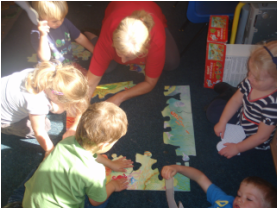 Playing together can be loads of fun!
Playing together can be loads of fun!
Personal, social and emotional development
Encouraging children to make friends and play together, using language and developing negotiating skills, particularly in taking turns and sharing.
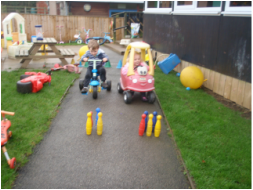
Physical development
Gaining control of their bodies through running and stopping games. Concentrating on riding the bikes safely and with increased control. Thinking about how to keep ourselves safe
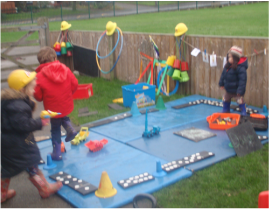
Communication and language
Encouraging children to introduce a story-line to their play, particularly outside and in the role play area. Children within a mixed age range are given the opportunity to have their input and learn to negotiate and share ideas and respond to their peers' ideas.
Encouraging children to introduce a story-line to their play, particularly outside and in the role play area. Children within a mixed age range are given the opportunity to have their input and learn to negotiate and share ideas and respond to their peers' ideas.
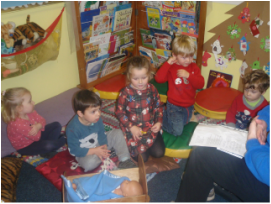
Literacy
Reading lots of stories with rhymes and playing games that encourage children to hear rhyming words.
Reading lots of stories with rhymes and playing games that encourage children to hear rhyming words.
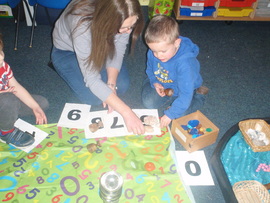
Mathematics
Recognising numbers to 5 or 10 and then 20 and beyond and counting objects in our environment.
Recognising numbers to 5 or 10 and then 20 and beyond and counting objects in our environment.
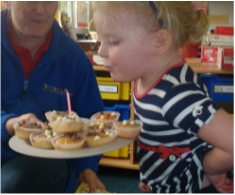
Understanding the world
Talking about how we celebrate birthdays, Christmas and other cultural celebrations in our different households. Know that some adults are safe to approach for help but that we should never ask a stranger to help us.
Talking about how we celebrate birthdays, Christmas and other cultural celebrations in our different households. Know that some adults are safe to approach for help but that we should never ask a stranger to help us.
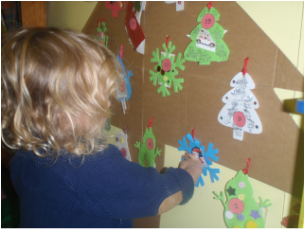
Expressive arts and design
Making up rhythms and singing simple songs. Making up a story-line in our role play.
Lots of creative crafts.
Making up rhythms and singing simple songs. Making up a story-line in our role play.
Lots of creative crafts.